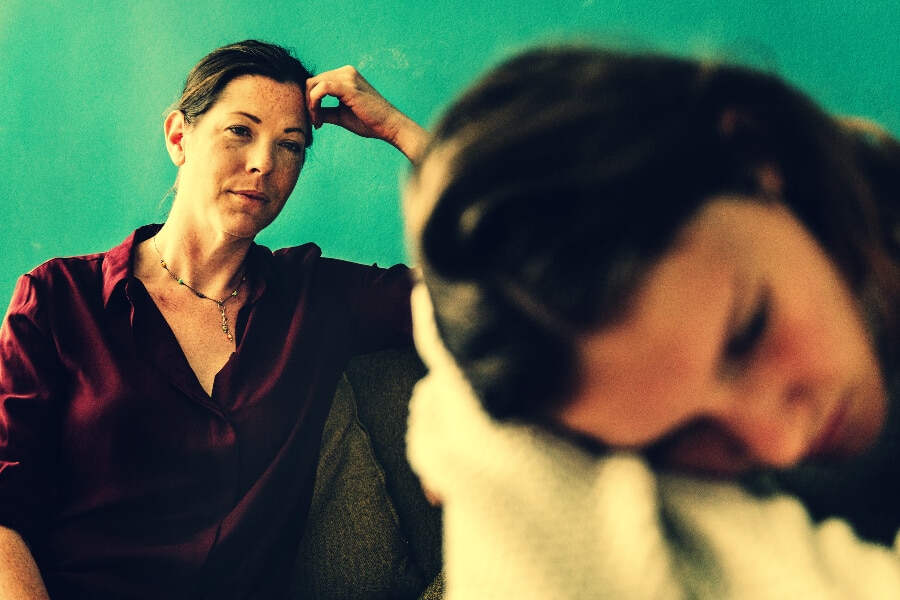When you look into your newborn’s eyes, a very natural and powerful thing occurs: An intense instinct to love, nurture, and protect this tiny life in your arms. I knew for certain that I would be the type of mom who would do anything for her children, who would always provide a home and a refuge for them. But how wrong I was.
There came a time in my life when I had to tell my child that she could no longer live under my roof—a moment that was antithetical to all that it means to be a mother.
The shift started when my oldest daughter started showing signs of depression and anxiety in her junior year in high school.
The shift started when my oldest daughter, Mary*, started showing signs of depression and anxiety in her junior year in high school. I’ve always been open with her about my mental health issues and struggles—and how I was actively fighting them, preparing her for a time when she might be diagnosed as well.
When that time came, she at first resisted going on medication and participating in therapy. Eventually, we found an antidepressant that stabilized her enough to get by—to finish high school and move on to college. But there was little joy in her life. Her goal was to get through school so she could get a job and make enough money to be on her own.
Read More: How Do You Let Go of Your Dreams for Your Grown Child?
When the Struggle Got Real
At 19, she found a way to get high. It wasn’t through drugs or alcohol. She began dating for the first time, and the endorphins that come with new relationships, sex, validation, and feelings of love had a huge impact.
Just like a drug, her relationship enabled her to make destructive choices. Her grades dropped. She skipped classes and work. She totaled her car and abused mine. She lied and left for days at a time to be with her boyfriend. She shirked her responsibilities, like dropping off her younger sister at school.
We struggled for months about this relationship. I saw her spiraling toward a huge fall, similar to when I was her age. In my case, I married her father when pregnant with her and then became a single parent by the time I was 21. I was so afraid of what her bottoming out would be. Watching her struggle was hurting me, triggering my depression and anxiety.
The Day That Changed Everything
Things came to a head while I was on a business trip. She had called out to work and taken my car without permission to stay with her boyfriend. Her sister needed help at school while she was 60 miles away, and Mary blew her off. Then she lied to me about the whole situation. When I got home, I was livid. After hours of fighting and yelling, I told her she had to leave.
When I faced what I had done, I felt like an utter failure as a parent.
When I faced what I had done, I felt like an utter failure, both as a parent and a daughter. My family would never turn its back on anyone, let alone one of their own. I was ashamed of my anger and weakness. But what was worse was that I felt relieved as well. I didn’t realize how much this worry over Mary had been affecting me. Once she was gone, I felt calmer. I didn’t know how to reconcile this relief, because what kind of mother feels better when their child is away from them? It turns out, I’m not alone.
When a Parent Has to Say “No More”
Susan Toth faced a similar struggle with her daughter Shannon. When the girl turned 17, things got dark—fights, stolen property, and an abundance of lies. A few years down the road, Shannon asked if a friend could move in; Toth and her husband agreed, still hoping to salvage a relationship with their child. But when the houseguest became disruptive and even damaged some property, they asked her to leave. Shannon, then 22, refused to leave her friend’s side. Pushed to their limit, Susan and her husband told Shannon she would have to go as well.
Toth said she felt both relief and worry once Shannon had gone.
“I knew Shannon wasn’t ready to be on her own yet, mostly due to her lack of financial responsibility,” she says. “I was worried about where she would stay and with whom. But our home became much more peaceful. There had been constant fighting in our house, and not just between me and Shannon. Her antics would cause fights between me, my husband, and our other two children.”
I missed him, yet I felt better when he wasn’t around.
Still, Susan says the relationship with her daughter is still a work in progress. Shannon still asks for money often, which causes fights between Toth and her husband. “I find it difficult to understand how she has turned out so completely opposite of what I wanted for her,” says Susan.
Amanda Watson, too, struggles with having to let go of her oldest son, Patrick, 23. Having started to do drugs in his mid-teens, Patrick became addicted, which led to years of anguish: felony charges, jail time, rehab, and psychiatric care. Amanda’s own emotional struggles worsened with the worry over her son, who would come home high, disappear for days or weeks, threaten suicide, break into their home, steal from them, and become violent. He even tried to kill his stepfather.
Three years ago, Amanda and her husband—at their wits’ end—changed the locks, put up security cameras, and barred him from the home.
“I was mentally drained by the time this happened,” Amanda says. “I was sad, but a large part of me was relieved. I missed him, yet I felt better when he wasn’t around.” Her son has now been clean for several months and is being allowed to live at home.
Sometimes Separation Is the Smartest Strategy

Toth and Watson’s stories help me realize that I did what was best, not only for Mary, but for myself. It is a hard lesson to learn, but one that is essential for mothers of self-destructive adult children, says Dr. Dana Dorfman, host of the 2 Moms on the Couch podcast and a psychotherapist who specializes in family therapy and life transitions.
“Personal sacrifice seems to be an inherent part of parenting; putting your own needs aside for those of your children,” she says. “However, when parents’ emotional or physical health is jeopardized, they are no longer able to be helpful to their children. This is a painful, yet essential delineation of boundaries that conveys several important messages to the adult child, such as ‘I love you, but I am separate from you. As a separate person, I must maintain my self-respect and dignity. I will not allow another to abuse me. This is not okay.'”
When parents’ emotional or physical health is jeopardized, they are no longer able to be helpful to their children.
As Dorfman says, this goes against our instincts to sacrifice our own well-being for our children. But there are ways to reframe our approaches to these situations that can make doing so easier. Amy Schafer, a licensed professional counselor and co-founder of Compass Counseling & Wellness, says that telling an adult child to leave the family home can actually enable them to move forward with their life in a healthier way.
“We can look at asking them to leave as something that is necessary for them,” Shafer says. “It trains them to value boundaries, expectations and self-care, which is difficult to teach, but without which can lead to generational enabling issues.”
Two Cautions
Do not let your own anger, hurt, or grief take control of you in the moment, both Shafer and Dorfman advise. This can lead to damaging words, such as name calling or saying things you don’t mean, which may cause lasting damage to a relationship. It’s best to communicate with the child that you need to step back and address the issue again once you’re calmer and thinking more rationally.
Don’t threaten to withdraw support and then not act. “Infinite ‘final chances’ only lessen the parents’ ability to follow through,” Shafer says. “This further lessens the child’s ability to see the cause and effect of their actions.” It took me a while to actually act on my threats. There was one incident that led to a warning, then a second one, after which I told her she wouldn’t be allowed to live with me anymore if she continued to see her boyfriend and not follow the house rules. When the third incident happened, I followed through.
Read More: A Mother’s Pain When Her Grown Daughters Don’t Get Along
A New Relationship Takes Root
A year has passed since that day. We didn’t speak for several months, but I kept tabs on Mary through her friends. She got emergency housing at the university she was attending, and at the end of the semester, we began talking again.
I recently helped her move into her first rental. She is standing on her own two feet, working full time, and taking on adult responsibilities. Though she isn’t sure where she will be in a few years, for now, she is happy and stable. Much more so than she was living with me.
We needed distance. She needed independence.
We needed distance. She needed independence. And though the way we parted was regrettable, our relationship is better for having made these hard decisions. We talk often. She is starting to feel comfortable enough to start addressing some of her issues, which is a huge step forward.
I’ve gone through a lot of changes, too. I’ve re-focused on being a full-time mother to one child and on the sidelines for the other. The decreased stress and realization that in a few more years I will have an empty nest has opened up new ways of thinking. New possibilities for my future. Simply put, I’m happier.
I know now that no matter where I go or what I do, I’ve given my kids the tools they need to make their way in the world. I’ll always be there to support them. But I have to do the same for myself, too. And that, I’ve learned, is okay.
*This name has been changed to protect privacy
A version of this story was originally published in April 2019.





















0 Comments